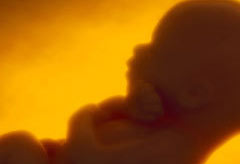Prenatal screening for autism a step closer
New research may enable autism screening

New research may enable autism screening
Prenatal screening for autism moved a step closer to being made possible after scientists discovered ways of potentially identifying the condition in unborn babies.
New research, released today, has found that high levels of testosterone in the amniotic fluid of pregnant women was linked to autistic traits in their children.
These findings mean that soon-to-be parents would be able test to see if their unborn baby has autism, which would then allow them to take the controversial decision to terminate the pregnancy.
There are now calls for a national ethical debate on the issue with parents of autistic children strongly opposed to prenatal screening, fearing that it would lead to greater discrimination and less support for them.
The disorder is also famously linked to geniuses, particularly those who demonstrate an extraordinary grasp of maths and music.
Professor Simon Baron-Cohen, director of the team at Cambridge University's autism research centre, told the Guardian, 'If there was a prenatal test for autism, would this be desirable? What would we lose if children with autistic spectrum disorder were eliminated from the population?'
Celebrity news, beauty, fashion advice, and fascinating features, delivered straight to your inbox!
'We should start debating this. There is a test for Down's syndrome and that is legal and parents exercise their right to choose termination, but autism is often linked with talent. It is a different kind of condition.'
There could also be opportunities to conduct research into treating the condition.
'We could do something about it. Some researchers or drug companies might see this as an opportunity to develop a pre-natal treatment. There are drugs that block testosterone,' he added.
'But whether we'd want to would be a different matter.'